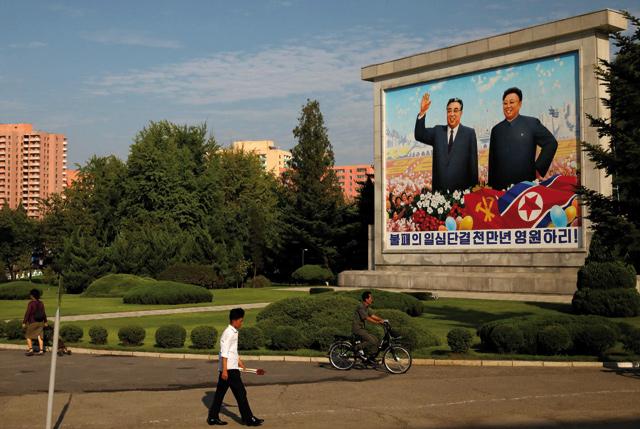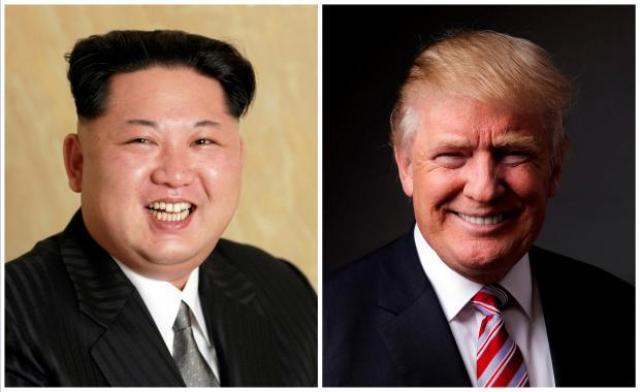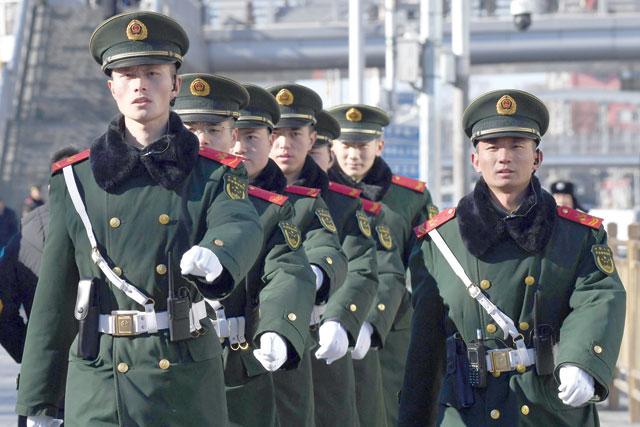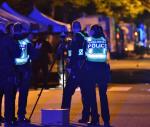You are here
North Korea’s Kim sets denuclearisation time line, prompting thanks from Trump
By Reuters - Sep 06,2018 - Last updated at Sep 06,2018

Residents pass by a painting featuring late North Korean leaders Kim Il-sung (left ) and Kim Jong-il ahead of 70th anniversary of North Korea's foundation in Pyongyang on Thursday (Reuters photo)
SEOUL/WASHINGTON — North Korea's Kim Jong-un has given his first time line for denuclearisation, aiming for the end of US President Donald Trump's first term, Seoul officials said on Thursday, prompting thanks from Trump who said they would "get it done together".
Kim and South Korean President Moon Jae-in will meet in Pyongyang between September 18 and 20 for a third summit and discuss "practical measures" towards denuclearisation, Moon's national security adviser, Chung Eui-yong, said a day after meeting Kim.
The summit could provide renewed momentum to talks over denuclearisation between North Korea and the United States, after Trump cancelled a visit to Pyongyang by Secretary of State Mike Pompeo last month citing lack of progress.
Kim told South Korean officials his faith in Trump was "unchanged" and that he wanted denuclearisation of the Korean Peninsula and an end to hostile relations with the United States before Trump's first term in office ends in early 2021, Chung said.
But there was no indication that Kim had offered concrete steps towards giving up his nuclear arsenal, something some US officials have said privately they doubt he is willing to do.
"He particularly emphasised that he has never said anything negative about President Trump," Chung said.
Trump welcomed Kim's remarks in a trademark Tweet.
"Kim Jong-un of North Korea proclaims 'unwavering faith in President Trump.' Thank you to Chairman Kim. We will get it done together!" Trump wrote.
Trump had previously hailed his landmark June 12 summit with Kim as a success and said the North Korean nuclear threat was over, despite little evidence to back that assertion.
In previous, failed talks, North Korea has said it could consider giving up its nuclear programme if the United States provided security guarantees by removing troops from South Korea and withdrawing its so-called nuclear umbrella of deterrence from the South and Japan.
US officials involved in the latest negotiations have said North Korea has refused to even start discussions about defining denuclearisation or other key terms such as "verifiable" and "irreversible", and has insisted the United States must first agree to simultaneous steps to reduce economic pressure.
Some analysts suggested Kim was flattering Trump in hopes of dividing the president from advisers who have advocated a tougher US stand.
"Kim just owns Trump. He knows his mark," Vipin Narang, a political scientist at the Massachusetts Institute of Technology who specialises in nuclear issues, said in a message on Twitter.
'Enormous amount
of work to do'
Pompeo, visiting New Delhi, said there was a long road ahead and "an enormous amount of work to do" on the denuclearisation process.
He visited Pyongyang in July, after which North Korea accused him of making "unilateral and gangster-like demands for denuclearisation".
Asked about US intelligence that North Korea was still advancing its weapons programmes, Pompeo noted Pyongyang had ceased its nuclear tests and test-firing missiles, which he said was a "good thing".
"But the work of convincing Chairman Kim to make this strategic shift that we've talked about for a brighter future for the people of North Korea continues," Pompeo said.
The State Department later said Pompeo was sending his newly appointed North Korea envoy, Stephen Biegun, to South Korea, China and Japan between September 10 and 15.
Signalling that Washington's concerns extend beyond Pyongyang's nuclear programme, the US government on Thursday filed criminal charges and imposed sanctions against an alleged North Korean hacker over the 2014 cyber attack on Sony Corp. and other "malign cyber activities".
Moon's National Security Adviser Chung said Kim had stressed the need for the United States to reciprocate North Korea's initial moves, which have included dismantling a nuclear test site and a missile engine facility.
"We support progress in inter-Korean relations and President Moon's statements that such progress must go hand-in-hand with denuclearisation," a spokesperson for the White House National Security Council (NSC) said when asked for comment on the meeting.
North Korea's official KCNA news agency said Kim told the South's envoys that his "fixed stand" was to turn the Korean Peninsula into "a cradle of peace without nuclear weapons, free from nuclear threat".
Chung said Kim showed "frustration over the doubt raised by some parts of the international community about his willingness to denuclearise, and asked us to convey his message to the United States".
"He said he would appreciate that such good faith is accepted with good faith," Chung said. "He expressed his strong will to carry out more proactive measures toward denuclearisation if action is taken in response to the North's preemptive steps."
US officials have previously said they have already made conciliatory gestures, such as halting joint military exercises with South Korea.
During his meeting with Kim, Chung delivered a message from Trump and will relay comments from Kim to US National Security Adviser John Bolton, Moon's spokesman, Kim Eui-kyeom, told reporters. Chung later spoke to Bolton and gave him a "comprehensive report", the NSC official said.
Trump spoke to Moon on the evening before Chung's trip and asked Moon to act as "chief negotiator" between Washington and Pyongyang, the spokesman said.
Kim and Trump held an unprecedented summit in Singapore in June, in which the North Korean leader made a broad, vague commitment to work towards denuclearisation of the Korean Peninsula. But negotiations have made little progress, while signs North Korea has maintained work on its weapons have emerged.
Under discussion is whether denuclearisation or declaring an end to the 1950-53 Korean War should come first.
The war ended with an armistice, not a peace treaty, meaning US-led UN forces, including South Korea, are technically still at war with the North.
"The United States shouldn't delay any further an end-of-war declaration, which the US president promised at the Singapore summit," the North's official Rodong Sinmun newspaper said in an editorial.
US officials have said such a declaration could weaken North Korea's incentive for denuclearisation, and create uncertainty about the purpose of 28,500 US troops stationed in South Korea, a legacy of the three-year war.
"Looks like Kim is trying to wash away worries that talks could stall or fail, knowing well that Washington is losing patience," said Koh Yu-hwan, a professor of North Korean Studies at Dongguk University in Seoul.
Related Articles
SEOUL — A high-level South Korean delegation met with Kim Jong-un in Pyongyang on Wednesday, as Seoul plans a new summit with the North Kore
SEOUL - North Korean leader Kim Jong Un's sudden overtures to Washington are making headlines around the world.
BEIJING — North Korean leader Kim Jong-un and Chinese President Xi Jinping discussed an expected US-North Korea summit in talks in Beijing o



















